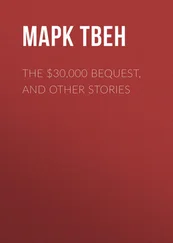Mark Twain - The 30,000 Dollar Bequest and Other Stories
Здесь есть возможность читать онлайн «Mark Twain - The 30,000 Dollar Bequest and Other Stories» весь текст электронной книги совершенно бесплатно (целиком полную версию без сокращений). В некоторых случаях можно слушать аудио, скачать через торрент в формате fb2 и присутствует краткое содержание. Год выпуска: 2004, Жанр: Классическая проза, на английском языке. Описание произведения, (предисловие) а так же отзывы посетителей доступны на портале библиотеки ЛибКат.
- Название:The 30,000 Dollar Bequest and Other Stories
- Автор:
- Жанр:
- Год:2004
- ISBN:нет данных
- Рейтинг книги:4 / 5. Голосов: 1
-
Избранное:Добавить в избранное
- Отзывы:
-
Ваша оценка:
- 80
- 1
- 2
- 3
- 4
- 5
The 30,000 Dollar Bequest and Other Stories: краткое содержание, описание и аннотация
Предлагаем к чтению аннотацию, описание, краткое содержание или предисловие (зависит от того, что написал сам автор книги «The 30,000 Dollar Bequest and Other Stories»). Если вы не нашли необходимую информацию о книге — напишите в комментариях, мы постараемся отыскать её.
The 30,000 Dollar Bequest and Other Stories — читать онлайн бесплатно полную книгу (весь текст) целиком
Ниже представлен текст книги, разбитый по страницам. Система сохранения места последней прочитанной страницы, позволяет с удобством читать онлайн бесплатно книгу «The 30,000 Dollar Bequest and Other Stories», без необходимости каждый раз заново искать на чём Вы остановились. Поставьте закладку, и сможете в любой момент перейти на страницу, на которой закончили чтение.
Интервал:
Закладка:
The novel now arrives at the point where the Major goes home to see his father. When McClintock wrote this interview he probably believed it was pathetic.
The road which led to the town presented many attractions Elfonzo had bid farewell to the youth of deep feeling, and was now wending his way to the dreaming spot of his fondness. The south winds whistled through the woods, as the waters dashed against the banks, as rapid fire in the pent furnace roars. This brought him to remember while alone, that he quietly left behind the hospitality of a father's house, and gladly entered the world, with higher hopes than are often realized. But as he journeyed onward, he was mindful of the advice of his father, who had often looked sadly on the ground, when tears of cruelly deceived hope moistened his eyes. Elfonzo had been somewhat a dutiful son; yet fond of the amusements of life—had been in distant lands—had enjoyed the pleasure of the world, and had frequently returned to the scenes of his boyhood, almost destitute of many of the comforts of life. In this condition, he would frequently say to his father, "Have I offended you, that you look upon me as a stranger, and frown upon me with stinging looks? Will you not favor me with the sound of your voice? If I have trampled upon your veneration, or have spread a humid veil of darkness around your expectations, send me back into the world, where no heart beats for me—where the foot of man had never yet trod; but give me at least one kind word—allow me to come into the presence sometimes of thy winter-worn locks." "Forbid it, Heaven, that I should be angry with thee," answered the father, "my son, and yet I send thee back to the children of the world—to the cold charity of the combat, and to a land of victory. I read another destiny in thy countenance—I learn thy inclinations from the flame that has already kindled in my soul a strange sensation. It will seek thee, my dear ELFONZO, it will find thee—thou canst not escape that lighted torch, which shall blot out from the remembrance of men a long train of prophecies which they have foretold against thee. I once thought not so. Once, I was blind; but now the path of life is plain before me, and my sight is clear; yet, Elfonzo, return to thy worldly occupation—take again in thy hand that chord of sweet sounds—struggle with the civilized world and with your own heart; fly swiftly to the enchanted ground—let the night-OWL send forth its screams from the stubborn oak—let the sea sport upon the beach, and the stars sing together; but learn of these, Elfonzo, thy doom, and thy hiding-place. Our most innocent as well as our most lawful DESIRES must often be denied us, that we may learn to sacrifice them to a Higher will."
Remembering such admonitions with gratitude, Elfonzo was immediately urged by the recollection of his father's family to keep moving.
McClintock has a fine gift in the matter of surprises; but as a rule they are not pleasant ones, they jar upon the feelings. His closing sentence in the last quotation is of that sort. It brings one down out of the tinted clouds in too sudden and collapsed a fashion. It incenses one against the author for a moment. It makes the reader want to take him by this winter-worn locks, and trample on his veneration, and deliver him over to the cold charity of combat, and blot him out with his own lighted torch. But the feeling does not last. The master takes again in his hand that concord of sweet sounds of his, and one is reconciled, pacified.
His steps became quicker and quicker—he hastened through the PINY woods, dark as the forest was, and with joy he very soon reached the little village of repose, in whose bosom rested the boldest chivalry. His close attention to every important object—his modest questions about whatever was new to him—his reverence for wise old age, and his ardent desire to learn many of the fine arts, soon brought him into respectable notice.
One mild winter day, as he walked along the streets toward the Academy, which stood upon a small eminence, surrounded by native growth—some venerable in its appearance, others young and prosperous—all seemed inviting, and seemed to be the very place for learning as well as for genius to spend its research beneath its spreading shades. He entered its classic walls in the usual mode of southern manners.
The artfulness of this man! None knows so well as he how to pique the curiosity of the reader—and how to disappoint it. He raises the hope, here, that he is going to tell all about how one enters a classic wall in the usual mode of Southern manners; but does he? No; he smiles in his sleeve, and turns aside to other matters.
The principal of the Institution begged him to be seated and listen to the recitations that were going on. He accordingly obeyed the request, and seemed to be much pleased. After the school was dismissed, and the young hearts regained their freedom, with the songs of the evening, laughing at the anticipated pleasures of a happy home, while others tittered at the actions of the past day, he addressed the teacher in a tone that indicated a resolution—with an undaunted mind. He said he had determined to become a student, if he could meet with his approbation. "Sir," said he, "I have spent much time in the world. I have traveled among the uncivilized inhabitants of America. I have met with friends, and combated with foes; but none of these gratify my ambition, or decide what is to be my destiny. I see the learned world have an influence with the voice of the people themselves. The despoilers of the remotest kingdoms of the earth refer their differences to this class of persons. This the illiterate and inexperienced little dream of; and now if you will receive me as I am, with these deficiencies—with all my misguided opinions, I will give you my honor, sir, that I will never disgrace the Institution, or those who have placed you in this honorable station." The instructor, who had met with many disappointments, knew how to feel for a stranger who had been thus turned upon the charities of an unfeeling community. He looked at him earnestly, and said: "Be of good cheer—look forward, sir, to the high destination you may attain. Remember, the more elevated the mark at which you aim, the more sure, the more glorious, the more magnificent the prize." From wonder to wonder, his encouragement led the impatient listener. A strange nature bloomed before him—giant streams promised him success—gardens of hidden treasures opened to his view. All this, so vividly described, seemed to gain a new witchery from his glowing fancy.
It seems to me that this situation is new in romance. I feel sure it has not been attempted before. Military celebrities have been disguised and set at lowly occupations for dramatic effect, but I think McClintock is the first to send one of them to school. Thus, in this book, you pass from wonder to wonder, through gardens of hidden treasure, where giant streams bloom before you, and behind you, and all around, and you feel as happy, and groggy, and satisfied with your quart of mixed metaphor aboard as you would if it had been mixed in a sample-room and delivered from a jug.
Now we come upon some more McClintockian surprise—a sweetheart who is sprung upon us without any preparation, along with a name for her which is even a little more of a surprise than she herself is.
In 1842 he entered the class, and made rapid progress in the English and Latin departments. Indeed, he continued advancing with such rapidity that he was like to become the first in his class, and made such unexpected progress, and was so studious, that he had almost forgotten the pictured saint of his affections. The fresh wreaths of the pine and cypress had waited anxiously to drop once more the dews of Heaven upon the heads of those who had so often poured forth the tender emotions of their souls under its boughs. He was aware of the pleasure that he had seen there. So one evening, as he was returning from his reading, he concluded he would pay a visit to this enchanting spot. Little did he think of witnessing a shadow of his former happiness, though no doubt he wished it might be so. He continued sauntering by the roadside, meditating on the past. The nearer he approached the spot, the more anxious he became. At that moment a tall female figure flitted across his path, with a bunch of roses in her hand; her countenance showed uncommon vivacity, with a resolute spirit; her ivory teeth already appeared as she smiled beautifully, promenading—while her ringlets of hair dangled unconsciously around her snowy neck. Nothing was wanting to complete her beauty. The tinge of the rose was in full bloom upon her cheek; the charms of sensibility and tenderness were always her associates. In Ambulinia's bosom dwelt a noble soul—one that never faded—one that never was conquered.
Читать дальшеИнтервал:
Закладка:
Похожие книги на «The 30,000 Dollar Bequest and Other Stories»
Представляем Вашему вниманию похожие книги на «The 30,000 Dollar Bequest and Other Stories» списком для выбора. Мы отобрали схожую по названию и смыслу литературу в надежде предоставить читателям больше вариантов отыскать новые, интересные, ещё непрочитанные произведения.
Обсуждение, отзывы о книге «The 30,000 Dollar Bequest and Other Stories» и просто собственные мнения читателей. Оставьте ваши комментарии, напишите, что Вы думаете о произведении, его смысле или главных героях. Укажите что конкретно понравилось, а что нет, и почему Вы так считаете.












